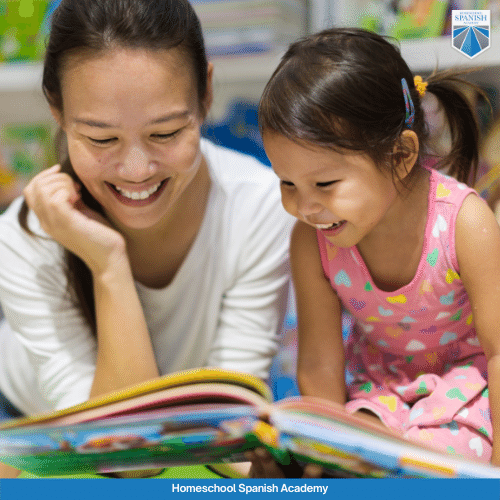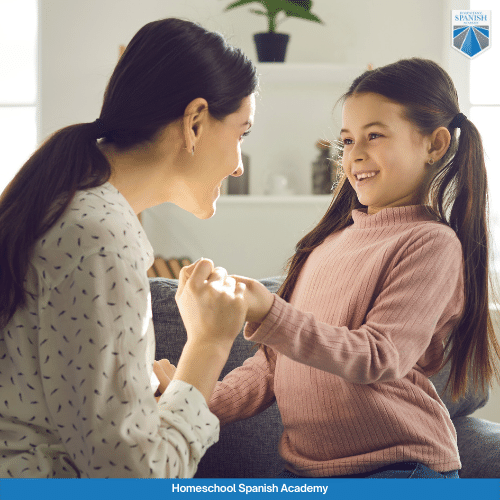
How to Help Your Child Understand What They Read
Reading comprehension is a skill that should be practiced from a very young age.
Parents of kindergarten or early elementary children wonder if their kids need help with their reading since their reading skills seem inconsistent. They tend to read slowly, forget words they already know, and don’t remember anything they read.
Are there any reasons to worry?
And if yes, how can we improve our child’s reading comprehension?
Let me show you what reading behaviors are standard at the early stages and what to do to improve your kid’s reading skills. In this article, I’ll also tell you how long your kid should read every day, how to teach reading comprehension, and where to get books to improve comprehension.
Who Is Homeschool Spanish Academy?
We’re an online Spanish school committed to empowering parents and their children to live happier lives, enjoy stronger learning outcomes, and experience real success. Learn more about our classes. ➡️
Necessary Skills For Reading Comprehension
Here are some skills that your kid must master to become an excellent reader later in life:
- Decoding Words
- Adding meaning to the words they read
- Relating what they read to their previous knowledge
A six and seven-year-old should be able to read without adding meaning to the words.
This stage is developed in the 1st and 2nd grades.
When they turn 9, your kid should be able to expand their knowledge through reading. But your kid needs reading practice at home to go from one stage to the next smoothly.

What Can You Expect From Early Readers?
You must be aware that early readers are inconsistent. Please, don’t lose your patience or grumble at your kids! And don’t worry if they want to read the same book repeatedly (it’s going to happen).
Your child is expected to read slowly and omit punctuation signs at this stage.
It’s absolutely normal that they read a word one day and can’t do it the next. They can even read it correctly on one page but not on the other. Quite often, they can’t tell what they’ve just finished reading.
You can check the grade-level standards to see how many words they should be able to read per minute. Remember, these were calculated using books and assessments designed for reading comprehension and fluency.
Comprehension Strategies For Reading
Now that you understand how kids read, you can apply strategies to improve your child’s reading comprehension.
This is not only for kids who fall behind. These strategies are also helpful for those who are good readers and want to improve.
Each day your kid should spend about 15-20 minutes reading—this is on top of your child’s reading during the school day. Remember that you’re investing in your child’s future education by teaching your child how to read a story.
Let’s look at some ideas and strategies to improve reading comprehension.
Before Reading
If you plan, you’ll get better and faster results.
- Choose interesting books
If your kid is into the topic, it’ll be easier to keep their attention. Reading will excite them, and they will naturally want to follow.
Avoid choosing complex books. Even texts that seem too simple can do wonders for reading comprehension.
- Talk about the topic
If you talk about the book with your kids and make them interested in it, it will help with their comprehension and expected vocabulary.
Point to the title, and see the pictures in the book. This way, you’re giving your kid helpful clues.
- Pre Teach Vocabulary
Level books usually have new words at the beginning or end of the book.
By pre-teaching new words, you’ll make your kid more confident and fluent. And, of course, it will help them understand what they read.

While-Reading
These are some things you can do during reading time.
- Use the pictures
Point to the pictures that illustrate what your kid is reading.
It will help them to create mental pictures in their head.
- Use the 5 W and H questions
These are the example questions that encourage thinking and reflection skills.
These words can help your kid understand the main idea of a book and the events depicted there.
- Who are the characters?
- What happened?
- Where are they?
- When did they…?
- Why did they…?
- How did it happen?
- Ask your child to predict what will happen next
This way, your kid engages better with the story and might want to read on to see if their guesses were correct.
- Ask what happened before?
Don’t wait until they reach the book’s end to remember what happened earlier.
Doing so can check if they understand what they’re reading or go back if needed.
This way they’ll learn to monitor their own reading and re-read sentences and parts they don’t understand.
If the book seems too complicated, choose another one to avoid frustration.
- Encourage your kid to guess the meaning
If your kids stop at a word they don’t know, ask them to guess what it means.
Show your kid how to use the text and pictures to infer words from the context.
It’s a handy skill that will come in handy later on with more complex texts.
Hear Your Child Speak Spanish! Your Free Trial Class Is Waiting ➡️
After Reading
Also, after your kid finishes a book, you can use some strategies to improve their reading comprehension.
- Ask your child for a summary
It’s always a good idea to ask your kid to retell a story in a few sentences.
You’re teaching them summarizing skills that are very important in learning new things by reading.
You can also ask about their favorite moment or the funniest thing or come up with an alternative ending.
- Ask them to recall what happened earlier
If you’re returning to a book, make your child remember what happened.
It will help them focus from the start and understand better what will happen next.
- Go back to new words
You can point to new words in a text and ask your child to reread them.
You can also ask them to make sentences with them.
- Re-read the book
Children read better when they feel confident.
Returning to the book you just read helps them decode words faster and become more fluent in their reading comprehension.
Check out more benefits of rereading books.
- Relate to other books
Ask your child if the story they’ve just read reminds them of other books and stories.
It’s another vital skill they will need later for comparing and contrasting essays.
- Don’t be afraid to ask for help
Finally, if you see that your child is visibly struggling with reading comprehension and doesn’t reach the expected skills, look for professional reading help for kids.
How to Improve Reading Comprehension in a Foreign Language
Working on your reading comprehension in a foreign language is no different; it also works for adults starting to learn a new language.
You can use the same strategies you used with books written in English.
You should begin with books paired with your capacity. Give it a shot and try this list of 10 Websites Offering Short Stories in Spanish for Beginners. Later, it’s a good idea to re-read the books you already know in English or look for bilingual versions. It’s also a good idea to combine text with audiobooks and highlight or underline new words.
Check out 12 Proven Methods For Reading Better In Spanish for more tips on improving reading comprehension in a foreign language.
Have Fun With Reading Comprehension
All the above strategies are important, but having fun is probably the most important piece of advice. If reading is not fun for your kid, they will not get better at reading comprehension.
Children learn best when they find pleasure in what they’re doing.
Also, don’t stop reading to your child yourself! Even when they already know how to read, reading together is a bonding experience and provides them with a good model.
Find more education-related content for families. It’s for you!
- 10 Homeschooling Styles You Need to Explore in 2023
- Local Learning Networks: Finding Homeschool Co-ops Near You
- Home Sweet Classroom: Creating Engaging Spanish Lessons at Home
- 7 Powerful Reasons Why Bilingualism in Children MattersPowerful Reasons Why Bilingualism in Children Matters
- Fall En Español: Exploring Autumn Activities for Kids
- Fun and Language: Spanish Playdates for Kids
- Milestone Moments: Tracking Kids’ Spanish Progress
- Building Blocks: Kid-Friendly Spanish Grammar
- 10 Homeschooling Styles You Need to Explore in 2023 - March 14, 2024
- Home Sweet Classroom: Creating Engaging Spanish Lessons at Home - October 13, 2023
- Expressing Appreciation in Spanish on World Teachers’ Day - October 5, 2023





